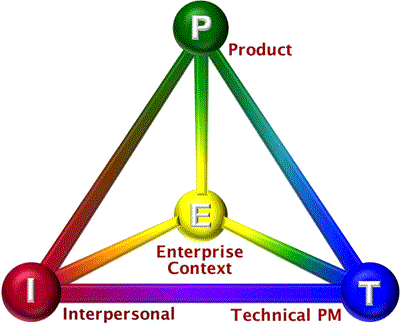The Talent Areas of Greatest Importance
Let us understand the needed Project Talent areas, with some of their elements,
so we can all better apply them in projects. Some organizations, until recently,
held tightly to the opinion that technical project processes were all we need
for success. IPMA's long-held position (since the 1990s) is that project management
processes are important, and two other factors have more impact on project and
business success. Those factors are leader-ship and interpersonal skills in the
team, and strategic linkage with the enterprise context. Recently, PMI[3]
has added their "Talent Triangle" to reflect their realization about our prerequisites
to project success.
But wait, there's more!
Now that the professional associations are all on the same page, consider this:
the Talent Areas (using my own labels) Technical PM, Interpersonal, and Enterprise
are great; but there is one area missing. I recognized that omission and added
it to my company's training and PM methodologies in the 1980s. Now I add Product
to your Talent quest.
 The
omission is logical. Professional organizations are involved in training, guiding,
and certifying project managers in project management. That is their focus. In
our project and program consulting, I was working with the entire enterprise,
seeking ways to improve their success rates I recognized that we needed representation
from the Product area, to truly help our customers achieve business success
through projects and programs. So, I offer the Talent Tetrahedron at the
right. The
omission is logical. Professional organizations are involved in training, guiding,
and certifying project managers in project management. That is their focus. In
our project and program consulting, I was working with the entire enterprise,
seeking ways to improve their success rates I recognized that we needed representation
from the Product area, to truly help our customers achieve business success
through projects and programs. So, I offer the Talent Tetrahedron at the
right.
Product Talent, Specific to the Application Area
Product Talent adds roles and responsibilities — and needed Role-Competences — for project Sponsors, Customer Managers; and key businesspeople serving as Business Analysts — with the right training and coaching. The solution developers on the team needed project management skills, but even more important were their skills in the product area, and their solution delivery expertise. I was happy, 20 years later, when IIBA[4] and other organizations realized the need for Product Talent, and recognized the role of Business Analysts.
The chart below shows some of the competences needed in each Talent Area. Each competence requires 2-6 or so Learning Outcomes. Today, most of the professional associations agree on the Technical, Interpersonal and Enterprise Context areas, and that is a very important improvement. And yet, how successful will your next project be if the Product competences are missing?
This Product Talent gap remains in many projects today. Clearly, someone is performing many of those actions; but who is taking responsibility for finding the talent needed to work most-effectively in those areas? Who is prioritizing the most-skilled talent for the highest-strategic value projects? Who even understands the need to do so?
|
Technical PM
|
Product
|
|
Scope & talent management
|
Objectives
|
|
Quality assurance & control
|
Business need
|
|
Risk & issue management
|
Current situation
|
|
Contracting & procurement
|
Problems & opportunities
|
|
Resource planning
|
Business requirements
|
|
Estimates, Delegation
|
Organizational changes
|
|
Scheduling, Cost control
|
Validation & verification
|
|
Reviews, Change control
|
Documentation & training
|
|
Status tracking & reporting
|
Business benefits & results
|
|
Interpersonal
|
Enterprise Context
|
|
Leadership & Influence
|
Strategic alignment
|
|
Sustaining the vision
|
Formal/informal organization
|
|
Relationship-building
|
Power navigation
|
|
Personal communication
|
Prioritization & resourcing
|
|
Conflict, crisis management
|
Benefit realization
|
|
Results orientation
|
Cultural, values appreciation
|
|
Engagement & Teamwork
|
Alliance-building
|
|
Emotional intelligence
|
Suppliers and contractors
|
|
Ethics
|
Political savvy
|
3. PMI® is a US-based, global professional association for project managers. Learn more about PMI at www.pmi.org.
4. IIBA® is International Institute of Business Analysis,
"the Voice of the Business Analysis Profession." See them at www.iiba.org.
|



